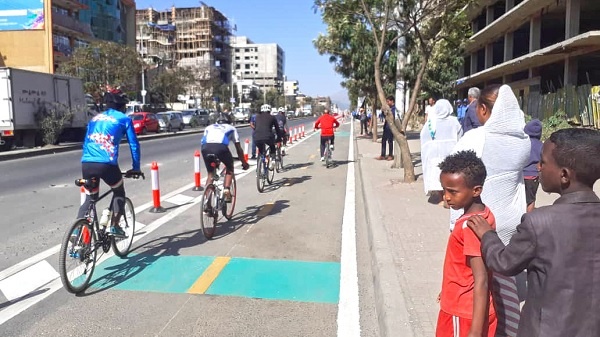
Addis Ababa is planning to build 200km of cycle tracks which will help to connect high density residential areas with commercial districts. The Safe Cycling Program aims to make the city a cycle-friendly city.
(Women4Climate) – In 2019, Addis Ababa adopted the Non-Motorized Transport Strategy following the commitment of the City Administration to invest in the development of a city-wide walking and cycling network that makes sustainable modes of transport safe, convenient, and easy to use.
“I am leading the safe cycling program in Addis Ababa to promote cycling as a mode of transport in addition to pedestrian and public transport projects, which are essential to combat climate.”
Regatu Solomon
Regatu Solomon, a Women4Climate from Addis Ababa, leads and coordinates one of the city’s projects – the Lebu–Jemmo Interim Cycle Corridor which is part of the Safe Cycling Program.
In the text below, Regatu offers her first-hand knowledge on Addis Ababa’s journey to becoming a cycling-friendly city.
The Safe Cycling Program in Addis Ababa
As part of the Non-Motorized Transport Strategy, the city is planning to build 200km of cycle tracks which will help to connect high density residential areas with commercial districts. The Safe Cycling Program aims to make Addis Ababa a cycle-friendly city by:
- Fostering an environment that ensures bicycles are accessible and affordable to all
- Promoting cycling in the city through awareness campaigns and public engagement targeting children and youth
- Providing 200km of safe and high-quality cycling infrastructure by 2028
- Developing guidelines and manuals for cycling infrastructure based on international best practices
- Capacity building for stakeholders regarding design and implementation, as well as, for traffic police officers on enforcement procedures
- And lastly, conducting research and studies for evidence-based decision making
At present, the city has invested in the development of three cycle corridors: the 2.8km Lebu–Jemmo interim corridor, 10.9km Kality–Tulu Dimtu corridor and 4.5km Garment–Jemmo corridor. Another existing project initiated by Abiy Ahmed (PhD), the prime minister of Ethiopia – the Entoto Park development, also includes the construction of cycling routes. Additionally, the plans of the Traffic Management Agency call for the redevelopment of the existing cycling corridor and creation of a wider cycling corridor network in the future.
About Lebu–Jemmo Cycle corridor
The Lebu–Jemmo Interim Cycle Corridor was inaugurated in February 2020 in presence of Endawok Abite, the acting deputy mayor of Addis Ababa, officials from the Transport Bureau, Traffic Management Agency, Ministry of Transport, Federal Transport Authority and supporting partners. Local residents, media representatives and cyclists also joined the inaugural event.
The corridor is about 2.8km in length with a mixed land use resulting in high curbside activity. This path was selected due to showing high cycle traffic density on car-free days and because it links well the other two major cycling routes that are under construction and will feed to the future Bus Rapid Transit corridor. The Lebu–Jemmo corridor is located in a vibrant and pedestrian friendly area due to its mixed-land use nature. The area is also a secondary center with commercial, civic and high-density residential land uses that are likely to attract bike riders. In order to create this bi-directional cycle lane, an underutilized parking lane was converted.
To raise awareness about the implementation of the corridor, a door-to-door community engagement approach was taken prior to the construction. Further, a close collaboration with traffic police and the media was established to create a common understanding of the project. In order to improve the functionality and understand the traffic in the interim corridor, opinion surveys, radar vehicular speed measurement and video data were and continue to be collected and analyzed to inform the decisions about the permanent infrastructure construction.
There are some challenges from the perspective of parking demand, pedestrian encroaching the cycle lane, awareness gap and enforcement problems. In order to keep up with these challenges, continuous engagement with the Police Commission, Traffic Management Agency and the community is underway in addition to regular follow-ups and maintenance of the site.
The project is led by the Addis Ababa Transport Bureau, under the directorate of Transport Study Strategy by the team of the public and non-motorized transport. The major stakeholders involved in the project are as follows: Traffic Management Agency, National Association of City Transportation Officials (NACTO), Institute for Transportation and Development Policy (ITDP), World Resource Institute (WRI), UN-Habitat, and Transformative Urban Mobility Initiative (TUMI).
Source: Women4Climate
